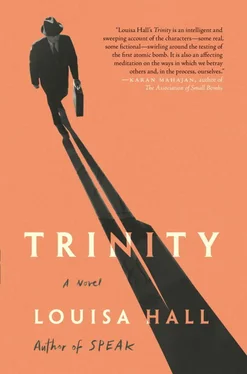But in that moment, Robert kept going. He wanted to tell the whole story. He had the same bug I used to have back at Rosemont, wanting so badly to get everything in, wanting the whole mess down on paper.
Not realizing there are always holes in the story, that the holes are the most powerful part, that it’s the holes people fall into, disappearing forever, dragging everyone and everything they love along with them.
But then Robert was sitting there at my desk, telling me that he’d been in love with Jean Tatlock, and they’d been close to marriage, but then they split up, and the next summer he and Kitty got married.
And by then, Robert told me, Hahn and Strassmann had produced fission, so they all knew the bombs could be made, and then Pearl Harbor was attacked, and General Groves chose him to lead the Manhattan Project.
And so on and so forth. On and on he kept talking: about the old school on the mesa and the mud roads, the Indian women who came up to clean, the hospital they built, the mountain lions you heard screaming at night, the way the pink cliffs looked bloodred when the sun set, how he learned about Jean in the winter, how he hadn’t gone back for her funeral, how he still wasn’t sure why she did it.
He talked all afternoon. He talked the way a river runs, with no sense of time, as if it could keep running forever.
By nighttime, he’d made us drinks, and I listened to him and knew that outside the cold stars were shining through the bare branches of the trees, and there was no one anymore for me to go home to.
And then I remembered again those days in Rosemont, staying up late, eating cereal, watching the leaves change on the trees, and feeling the press of my great ambitions, my desire to write a novel about the nuclear age.
And then I realized, with a private, terrible laugh, that Robert was describing himself as if presenting to me the central character of my Great American Novel.
There he was, the flawed but still noble hero, the figure fallen from myth.
And for a moment, I thought that perhaps I’d found my way to this office—perhaps Kathy and I had driven to Princeton and my sister had died and I’d married Stan all just to find my way to this office—so that Robert would sit down at my desk and give me the seed of my Great American Novel, teeming with immigrants and American cities and the hero who heads out west and the great violence and the secret shame and the bodies strewn and the guilty hero’s belated confession.
It was as if he’d come to me like some angel God sent, to say here is your reward for keeping your eyes open in church.
Here is your recompense for your unhappy youth, for the time that you wasted, for those changing leaves, for your body that dried up under your husband and the nights you spent awake, longing for your lost sister.
And thinking that, I wanted to cry.
Then I did start crying a little.
Because by then, it was too late. I didn’t care about writing a Great American Novel. I just didn’t care. I was sick to death of my ambitions, and by then, if a Great American Novel had shown up on my desk, I’d have thrown it out for the pleasure of losing another thing I’d wanted to treasure.
By then I’d have thrown out everything left on this earth and the whole round planet as well, just to be lost along with my sister.
Just to be lost and come home again with my sister.
But of course the dead don’t ever come back. The weeds just grow fat over the bones of their bodies.
So then I stopped crying, and Robert handed me a handkerchief and looked at me with his sad eyes and kept talking.
THAT WAS FEBRUARY. IN MARCH, THEY DETONATED THE SECONDhydrogen bomb, which was bigger than anyone thought.
The winds shifted, too, so fallout spread over the inhabited Rongelap and Rongerik atolls.
It spread as far as Australia, India, and Japan. A Japanese fishing boat was so badly exposed that all the crew members fell immediately ill with radiation sickness.
The Rongelap and Rongerik islanders were evacuated forty-eight hours after the test. Three years later, they were returned. Then they were evacuated again, and in the end, if I remember it right, something like twenty out of twenty-nine Rongelap children had cancer.
Needless to say, the test was conducted over Robert’s objections.
But by then it didn’t matter, because his security clearance had been temporarily revoked until the hearings were through, and nobody was listening to his opinions.
A month later, he and Kitty went to Washington, and the security hearings lasted three months. And that lawyer was right: everything did get leaked to the public. All his secrets came out, even the story about Jean, and all the lurid details about that trip to visit her, how he went to see her not because she was a member of the Communist Party but because he still cared for her very much, and the Mexican café where they danced, and the exact time at which they left, and drove back to her apartment, and spent the night together in her bedroom.
Several times in the course of the proceedings, Robert was forced to admit to all that again, while Kitty sat on a couch in the back of that windowless room, her eyes wide open and very dark, her leg in a cast because she fell down the stairs in those otherworldly weeks leading up to the hearings.
At three thirty, the rain stops. A new quiet settles outside the shelter. According to Frank, whom Oppenheimer has put in charge of the shelter, the only sound that can be heard is the croaking of the spadefoot toads that have emerged from their underground tunnels to gather in the puddles formed by the rainfall.
Outside, in the darkness, their pale throats extend and contract. Their webbed feet grip the wet stones.
And inside the shelter, Oppenheimer continues to wait.
I don’t know what he does. I can’t find any accounts.
Maybe he’s drinking coffee. Maybe he stands and goes to the doorway. Maybe he looks out at the desert, where the clouds have finally dispersed, and ten thousand yards in the distance the shot tower is illuminated by starlight.
It looks like an oil derrick, or maybe a steeple. Does Oppenheimer consider that? Does he think of the mice? Does he think of Gruber’s death? Does he remember the eight hundred Spanish settlers, or the millions dead in this war, or the hundreds of thousands whose deaths are still coming?
Does he look out at that steeple and think of the dead, or does he think of the living, or does he remember the name he chose for the test, and does he consider the reasons he chose it?
Trinity . A strange, religious name for a bomb test. He’ll never explain why he picked it. Nearly two decades later, General Groves will finally wonder, then write to ask if Oppenheimer chose that particular code name because it’s common to rivers and peaks in that part of the country.
Oppenheimer will reply:
Why I chose the name is not clear. There is a poem of John Donne, written just before his death, which I know and love. From it a quotation:
As West and East
In all flatt maps—and I am one—are one,
So death doth touch the Resurrection.
That still does not make a Trinity; but in another, better-known devotional poem Donne opens, “Batter my heart, three person’d God; — .” Beyond this, I have no clues whatever.
Two decades after the test, that’s all the explanation he’ll manage: Why I chose the name is not clear . That, and a couple of fragments of poems. Beyond this, I have no clues whatever.
Testimonial 5
Lía Peón
St. John, 1958
Читать дальше












